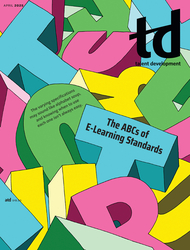TD Magazine Article
A Pal and a Confidant?
Workplace friendships either improve happiness or cause conflict.
Tue Apr 01 2025

Bookmark
While most workers report forming close bonds with colleagues, there are drawbacks, according to Friendships in the Workplace, a MyPerfectResume report based on a poll of 1,000 US workers about their experiences with workplace friendships.
Office relationships have adjusted with the times. Forty-two percent of workers met their closest colleagues in person, while 31 percent formed friendships through virtual platforms such as Microsoft Teams and Zoom.
Two-thirds of employees said they've experienced positive effects when making friends at work, such as increased collaboration, productivity, and job satisfaction. "These connections can rival those outside work," the report states. One-third of respondents feel closer to their work friends than their outside friends. Workplace friendships can also address employee loneliness. According to Gallup's 2024 State of the Global Workplace report, one in five individuals worldwide feel lonely at work.
To assess loneliness, Gallup developed the Work Loneliness Scale, screened participants in three categories (highly lonely, moderately lonely, and minimally lonely), and presented individuals with a series of scenarios regarding social opportunities in the workplace. Numerous participants described their companies as "toxic," "hostile," and "biased." Individuals cited environments rife with lying, malicious gossip, and cliques. Real connections and true friendships with colleagues and managers can combat those negative feelings.
"The love and support and the compassion that my whole organization had for me … let me know that I was a part of this organization and why I probably will never ever consider leaving," a customer service representative at a mortgage company shared with Gallup.
"Building strong, trusting relationships at work can open doors to new opportunities and career advancement," explains MyPerfectResume's report. "However, the success of these relationships often depends on maintaining a balance between professionalism and personal connection."
In fact, most individuals report conflicts that stem from workplace friendships. One difficulty is favoritism, which creates the perception of inequality and erodes trust among colleagues. The other downsides of workplace friendship are worsened work-life balance, decreased motivation, reduced job satisfaction, and compromised decision making.
As Nancy Rothbard, a management professor at the University of Pennsylvania's Wharton School, states in an interview with Knowledge at Wharton, "Sometimes you get caught up in some of the dynamics and it can be really distracting." Rothbard presents a scenario in which a person must choose where to allocate budget resources. If a stakeholder is a friend, it can be difficult to disagree with their stance due to maintaining the friendship and avoiding potential anger. "You might hold back even though you believe there's another direction that might be better for the organization," she explains.
Ultimately, Rothbard advises that "if you're in a close friendship, you need to be aware of the impact that's having on other people."

